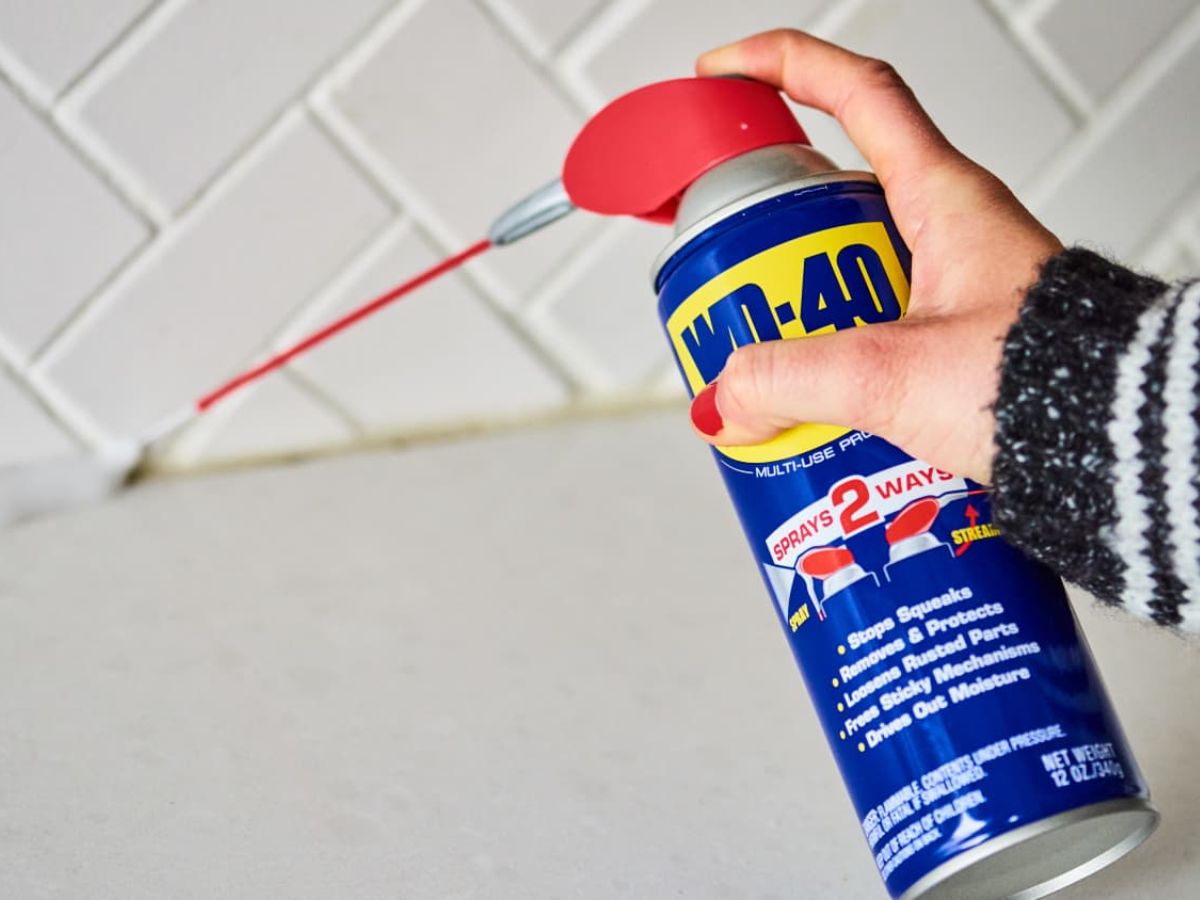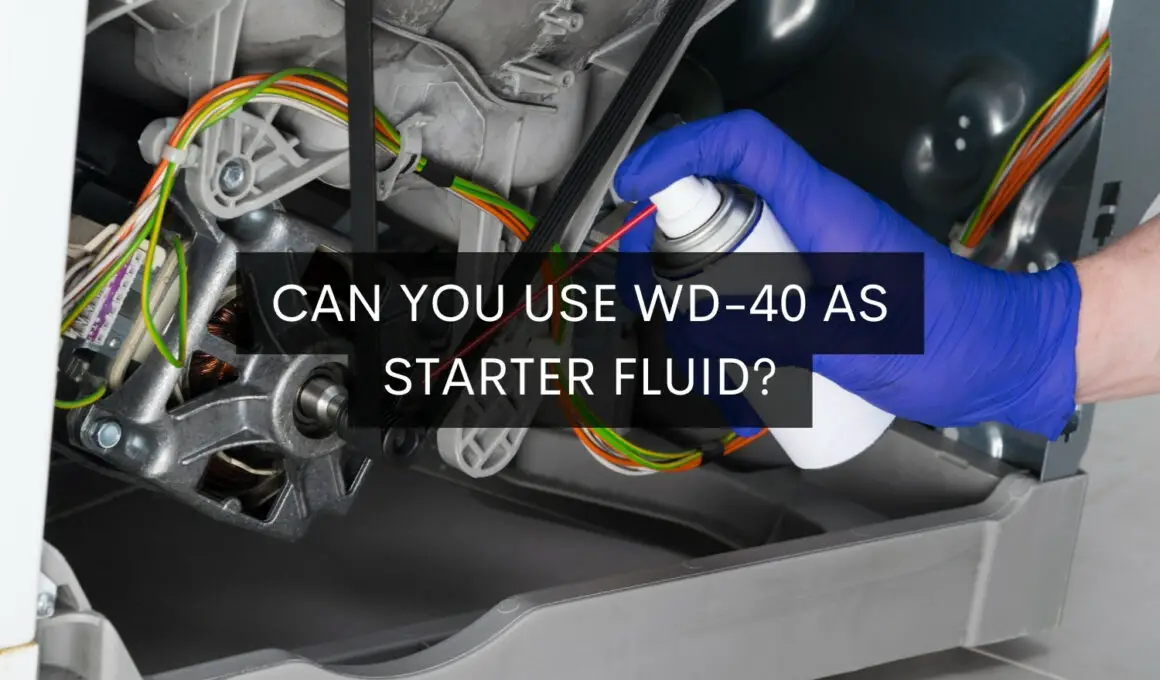In This Article Show
I’ve come across all sorts of tips, tricks, and supposed ‘life hacks’ regarding engine maintenance. One such topic that keeps popping up is about using WD-40 as a starter fluid.
While it’s great to experiment and find alternative solutions, it’s also crucial to know the consequences and whether these hacks actually work. So, today, let’s delve into the intriguing question: Can you use WD-40 as a starter fluid?
WD-40 and starter fluid, both are household names in garages but serve distinct purposes. While starter fluid is your go-to product to kickstart a stubborn engine, WD-40 is widely recognized as a multipurpose lubricant and water-displacement spray.
But, could they interchangeably be used? The answer isn’t as straightforward as you might think and requires a fair understanding of both products.
In this blog post, drawing upon my years of on-field experience as a mechanic, we’ll explore the properties of WD-40 and starter fluid, debunk some common misconceptions, discuss the possible effects of using WD-40 as a starter fluid, and consider some safe and effective alternatives.
This exploration will give you a comprehensive understanding of whether WD-40 is a viable starter fluid substitute.
What is Starter Fluid?
When it comes to getting an engine up and running, especially one that’s proving to be stubborn or has been sitting idle for a while, starter fluid, also known as starting fluid or engine starter, is a handy product to have in your toolset. But what exactly is it?
Starter fluid is a highly volatile and flammable aerosol spray. Its primary ingredient is typically diethyl ether, which is characterized by its ability to ignite under a wide range of temperatures and conditions. Combined with other elements such as heptane, which aids ignition, and carbon dioxide, which acts as a fuel, starter fluid is designed to help engines start more quickly and efficiently.
This product is most commonly used in gasoline and diesel engines, particularly during cold weather conditions. Cold temperatures can make it difficult for the engine to reach the needed heat levels for fuel combustion.
By introducing starter fluid into the engine’s intake manifold, the heat produced from its combustion helps the engine’s regular fuel to vaporize and ignite more readily, effectively kickstarting the engine into operation.
However, while starter fluid can be a helpful tool, it’s important to remember that it should be used sparingly and cautiously. Overuse or misuse can lead to engine damage, emphasizing the necessity to understand not just what starter fluid is, but how it interacts with your engine.

Understanding WD-40
WD-40, a product recognized globally and found in households and garages alike, has a multitude of uses, but before we get into that, let’s delve into what exactly WD-40 is.
WD-40 is an acronym for ‘Water Displacement, 40th Formula’. The name itself is quite telling of its original purpose – it was developed as a formula to prevent corrosion by displacing water. Created in 1953 by the chemist Norm Larsen for the Rocket Chemical Company, the name signifies that it was the 40th attempt to get the water-displacing formula right.
At its core, WD-40 is made up of a blend of petroleum-based oils, various aliphatic hydrocarbons, and a carrier agent that helps it spread and penetrate. It’s also important to note that WD-40 is not conductive and is safe to use on electrical parts.
So, what is it typically used for? Due to its lubricating and water-displacing properties, WD-40 is commonly used to lubricate moving parts, prevent rust, displace moisture, and even clean various surfaces. It’s the sort of do-it-all product that many of us use to silence squeaky hinges, loosen rusty bolts, and clean grease and grime off surfaces.
However, despite its versatility, it’s essential to understand that WD-40 is not a one-size-fits-all solution for every problem. Each product is designed with a specific purpose and set of uses in mind. That brings us to the question, despite its many uses, is WD-40 suitable and safe to use as a starter fluid?
Common Misconceptions About WD-40 and Starter Fluid
In the world of mechanics and DIY enthusiasts alike, various myths and misconceptions abound, particularly when it comes to the interchangeability of products like WD-40 and starter fluid.
These misconceptions often arise due to a lack of understanding of the specific compositions and functions of these products. So, let’s clear up some of the fog surrounding these two items.
1. WD-40 is the same as Starter Fluid
This is probably the most common misconception. Yes, both WD-40 and starter fluid come in similar-looking aerosol cans and both have a range of uses in the mechanical world, but that’s where the similarities end.
As we’ve already discussed, each has a unique chemical composition designed for specific tasks. Starter fluid’s volatile nature helps to ignite an engine quickly, while WD-40 is a lubricant and moisture-displacer.
2. WD-40 can be used as a fuel
Because WD-40 is petroleum-based, many believe that it can be used as a fuel for engines. However, while petroleum distillates can burn under certain conditions, they do not have the same ignition properties as fuels designed for combustion in an engine.
Using WD-40 as a fuel can lead to inconsistent engine performance, and in some cases, even damage.
3. Starter Fluid is harmful to Engines, but WD-40 is not
It’s essential to remember that misuse of any product can lead to harm. Starter fluid can indeed damage an engine if overused or used incorrectly due to its highly combustible nature.
However, this doesn’t mean WD-40 is inherently ‘safer’ for the engine. Used in a manner it’s not designed for – such as a starter fluid – it too can cause engine problems.
Understanding these misconceptions is crucial to safely and effectively maintaining your engine.
Can You Use WD-40 as Starter Fluid?
So, we arrive at the heart of the matter – can WD-40 be used as a starter fluid? The short answer is, technically yes, it can be used. But should you use it? That’s a whole different question.
Given its flammable nature, WD-40 can ignite when introduced to a hot engine and therefore could be used to start an engine, much like a starter fluid does. This is where the myth starts, leading some people to believe that WD-40 can be an effective substitute for a dedicated starter fluid.
However, significant differences between the chemical properties and compositions of WD-40 and standard starter fluid make WD-40 far less effective and potentially more harmful when used as a starter fluid.
Starter fluid is specifically formulated to aid in an engine’s ignition, especially under challenging conditions such as cold weather. Its primary ingredient, diethyl ether, has a much lower flash point than the petroleum-based oils in WD-40, which means it ignites more readily and provides a quicker, more powerful combustion that can kickstart an engine more efficiently.
On the other hand, while WD-40 can burn and cause a kind of combustion, it’s not designed for this purpose. The combustion it produces is less powerful or reliable than a designated starter fluid. This means it might not provide the ‘kick’ necessary to start a stubborn engine.
Furthermore, WD-40’s primary purpose is to displace water and act as a lubricant, not to aid in combustion. When used as a starter fluid, it can leave oily residues in the combustion chamber and on the spark plugs, which could lead to a host of other issues including carbon buildup and spark plug fouling.
Potential Risks of Using WD-40 as Starter Fluid
While it may seem like a handy solution, using WD-40 as a starter fluid comes with a number of potential risks that could lead to both short-term and long-term damage to your engine. Here are some of the main concerns:
1. Carbon Buildup
When burned, WD-40 can leave behind a carbon residue. Over time, if WD-40 is used frequently as a starter fluid, this carbon can accumulate in the engine, leading to a buildup that can negatively affect engine performance. If left unchecked, it can cause sticky valves, reduced fuel efficiency, and potentially even engine failure.
2. Spark Plug Fouling
WD-40 is oily in nature, and when used as a starter fluid, it can lead to fouling of the spark plugs. A fouled spark plug can cause a range of issues, from difficulty starting the engine to misfires while the engine is running.
3. Damage to Oxygen Sensors and Catalytic Converters
Oxygen sensors and catalytic converters, which play vital roles in controlling engine emissions, can be adversely affected by the residues left behind when WD-40 is used as a starter fluid. This can increase emissions, reduced fuel efficiency, and potential engine damage.
4. Inconsistent Combustion
As mentioned earlier, while WD-40 is flammable, it doesn’t provide as powerful or consistent combustion as a designated starter fluid. This inconsistency can lead to hard starting or incomplete combustion, both of which can put undue stress on your engine.
5. Potential Fire Risk
Given its flammability, inappropriate use of WD-40 can lead to fire risks, especially if used in a hot engine or near hot exhaust parts.
Alternatives to Using WD-40 as Starter Fluid
If you find yourself without starter fluid and in need of getting an engine going, there are safer and more effective alternatives than resorting to WD-40. Here are a few options to consider:
1. Carburetor Cleaner
Much like starter fluid, carburetor cleaner is highly volatile and can be used to help start an engine. While not quite as effective as dedicated starter fluid, it’s generally safer and less likely to cause damage than using WD-40.
2. Aerosol Brake Cleaner
Another alternative is aerosol brake cleaner. Its chemical properties make it combustible under the right circumstances. However, this should only be used sparingly and cautiously, as overuse can harm the engine.
3. Gasoline
In dire circumstances, you could use a small amount of gasoline. It’s combustible and, being the engine’s regular fuel, it won’t leave any harmful residues. However, it’s essential to use extreme caution if you decide to go this route, as gasoline is highly flammable and dangerous.
4. Keep a Spare Can of Starter Fluid
The best solution, however, is to keep an extra can of dedicated starter fluid on hand. This eliminates the need for makeshift solutions and ensures you’re using a product specifically designed for the task at hand.
Remember, using alternatives should only be considered as a last resort. Continual use of these products in place of starter fluid could lead to long-term damage to your engine. It’s always best to use products for their intended purpose to ensure the best performance and longevity of your engine.
Frequently Asked Questions
Can WD-40 be used as a starter fluid?
While WD-40 can technically be used as a starter fluid due to its flammable nature, it’s not recommended because it’s not designed for this purpose. Regular use of WD-40 as a starter fluid can lead to potential engine damage and a less effective combustion compared to using a dedicated starter fluid.
What is the difference between WD-40 and starter fluid?
WD-40 is a multipurpose lubricant and water-displacement spray. It’s used for a wide range of tasks, such as lubricating moving parts and preventing rust. Starter fluid, on the other hand, is designed to aid in starting an engine, especially in cold conditions. It has a different chemical composition that allows it to ignite easily and provide a quick, powerful combustion to kickstart an engine.
Can I use WD-40 as a fuel for my engine?
No, WD-40 should not be used as a fuel. Although it is petroleum-based and can burn under certain conditions, it does not have the same ignition properties as engine fuels. Using it as a fuel can lead to inconsistent engine performance and possible damage.
What are some alternatives to using WD-40 as a starter fluid?
Some alternatives include carburetor cleaner, aerosol brake cleaner, or even a small amount of gasoline. However, these should only be used as a last resort, and regular use can lead to engine damage. The best solution is to use a product specifically designed as a starter fluid.
Can using WD-40 as a starter fluid damage my engine?
Yes, using WD-40 as a starter fluid can potentially damage your engine. The combustion of WD-40 can leave behind residues that can lead to carbon buildup and spark plug fouling. In addition, it can affect oxygen sensors and catalytic converters, increasing emissions and reducing fuel efficiency.
Wrapping it up
In conclusion, while it’s technically possible to use WD-40 as a starter fluid, it’s not recommended due to its potential for causing engine damage and its less effective combustion capabilities.
While WD-40 is an exceptional product for many applications, it’s crucial to remember to use it for its intended purposes. For starting an engine, especially in challenging conditions, always opt for a dedicated starter fluid or other safe, effective alternatives.













